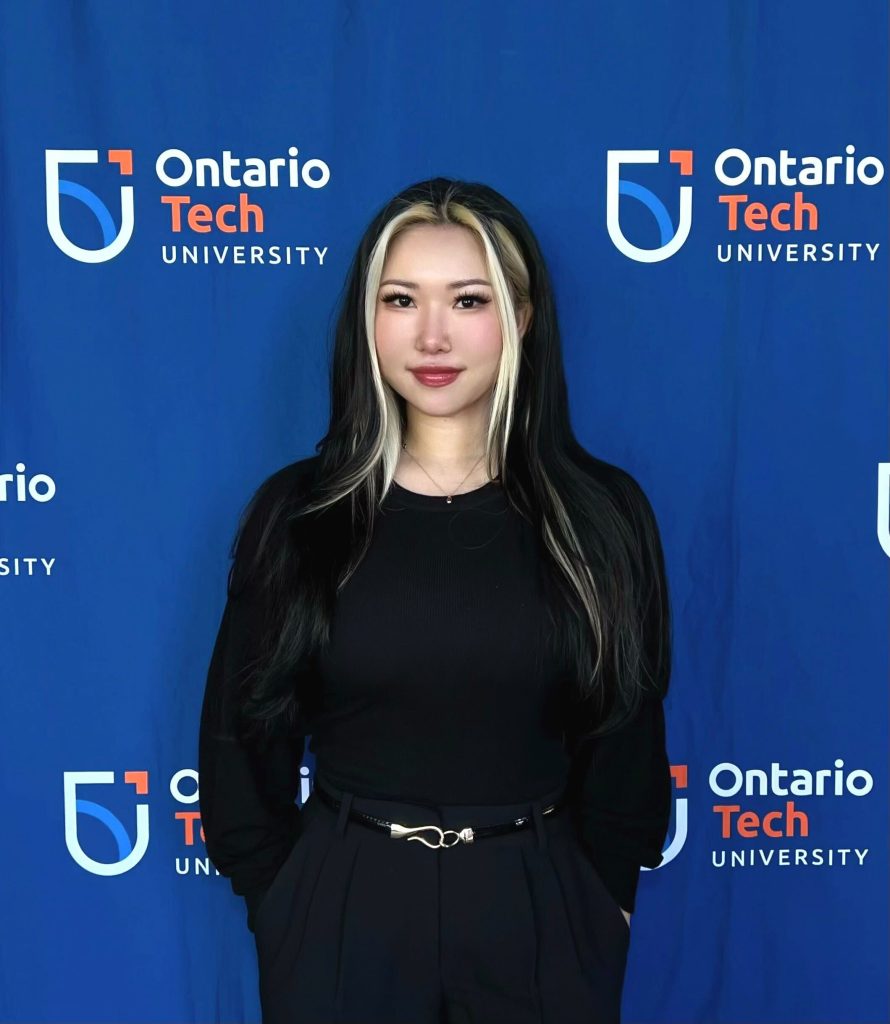
Dr. Denina Simmons – Assistant Professor and Canada Research Chair (Tier II)
Denina (Nina) joined the Faculty of Science at Ontario Tech University in July 2018, where she is the Principal Investigator of the Aquatic Omics Lab, and is also responsible for the Aquatic Facility, and the BioMETRIC (Biomolecular Excellence, Training, Research, & Innovation Centre) Facility.
Nina received her Undergraduate degree from Ryerson University and then completed her Master’s and Doctoral degrees at Trent University. Nina completed two consecutive postdoctoral fellowships at Environment Canada and after that, she had two consecutive contracts working on ‘Omics projects with the Ontario Ministry of Environment, Conservation, and Parks.
Theresa Warriner, MSc. – Aquatic Laboratory Technician
Theresa joined the lab in Jan 2022. She manages the Aquatic Facility, and does a wide variety of work in the lab. She assists students with experiments in the lab and with fieldwork.
Theresa has extensive background in fish research, with a special interest on fish behaviour. She completed her Master’s of Science at the Great Lakes Institute for Environmental Research at University of Windsor with Dr. Oliver Love and Dr. Cristina Semeniuk examining the effects of maternal and thermal stress on juvenile Chinook salmon. She completed her Bachelors of Science at McMaster University, completing her Honours thesis on the effects of wastewater effluent on Bluegill sunfish behaviour with Dr. Sigal Balshine.
Theresa is an avid naturalist, and likes to spend her free time hiking, camping, and gardening. She also likes some indoor activities such as crocheting or hanging out with her cats.
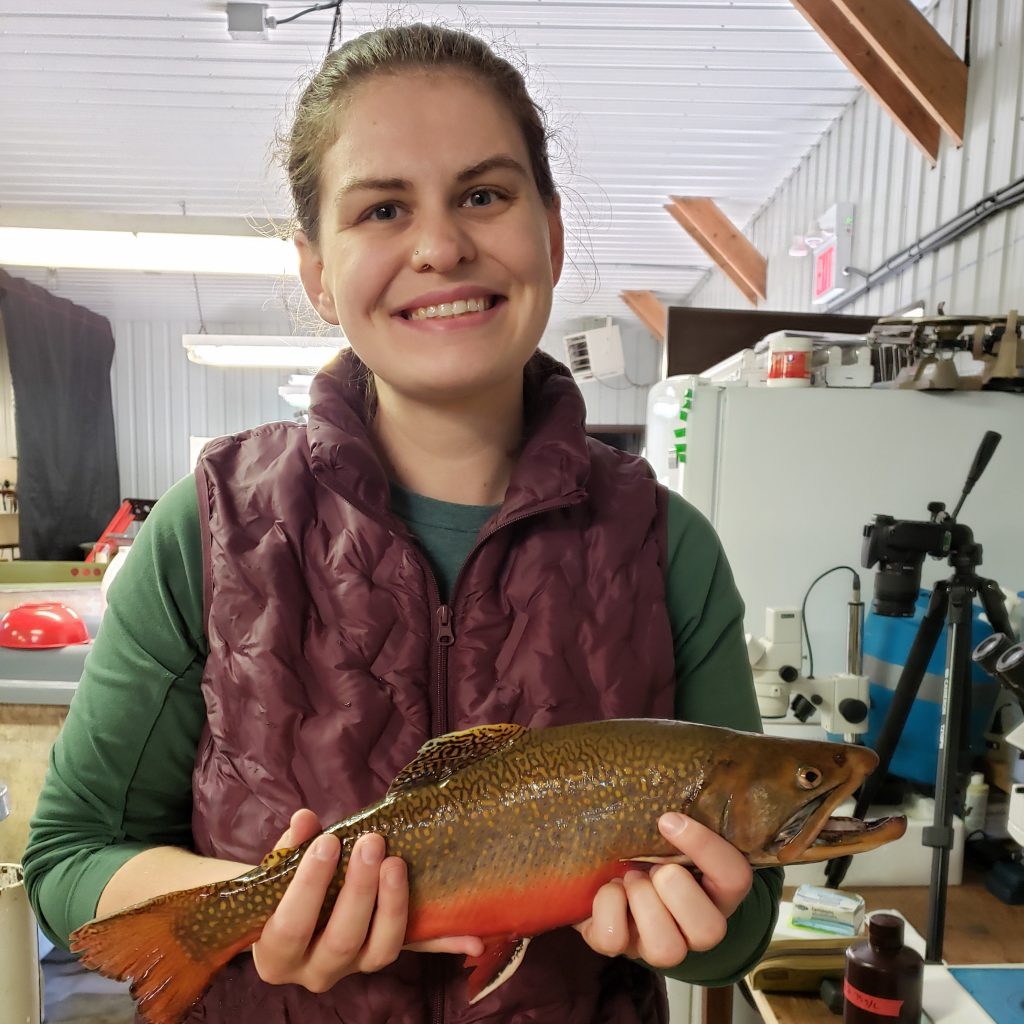
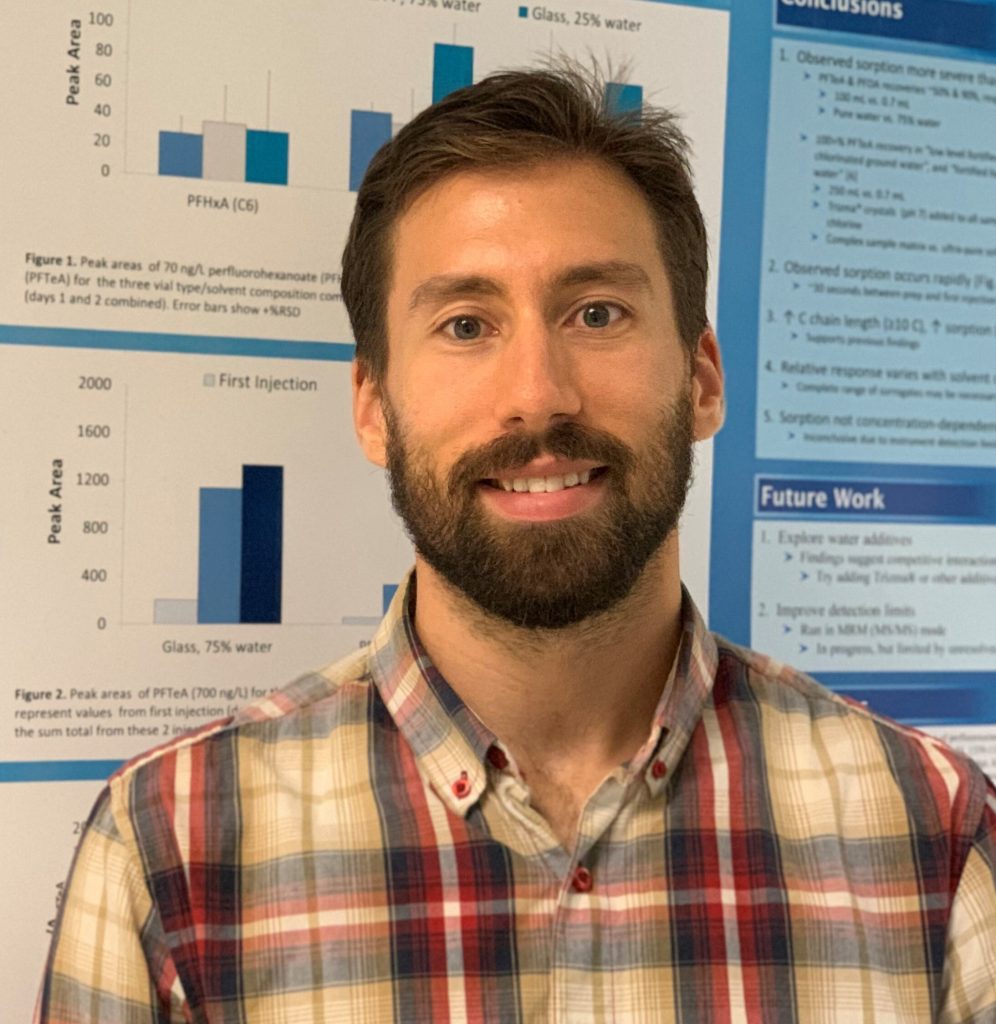
Dr. Adam Point, PhD. – Postdoctoral Fellow
Adam joined the Aquatic Omics Lab in November 2022. Currently, he contributes his analytical chemistry background to two untargeted omics projects – identifying potential wastewater protein markers for human diseases and uncovering proteomic and lipidomic perturbations in zebrafish embryos caused by developmental exposure to perfluoroalkyl substances (PFAS).
Adam received his PhD in Environmental Science and Engineering from Clarkson University in Potsdam, New York in May of 2022. Under the United States Environmental Protection Agency’s (USEPA) Great Lakes Fish Monitoring and Surveillance Program, Adam studied spatiotemporal PFAS trends in top predator fish across the Great Lakes basin and compared PFAS concentrations and serum proteomes among three Lake Ontario fish species to determine whether the observed variability in PFAS bioaccumulation potential among species could correspond with interspecies serum proteome diversity. This proteomics research kindled Adam’s interest in applying omics approaches to environmental toxicology, and led him to the Aquatic Omics Lab.
Adam is an avid outdoorsman from the heart of the Great Lakes region. His life-long passion for outdoor recreation built his sense of stewardship that motivates his environmental research interest.
Dr. Erico Oliveira Pereira, PhD. – Postdoctoral Fellow
Erico has been a postdoctoral fellow in the Aquatic Omics Lab at Ontario Tech University since October 2024. He received his PhD in Environmental Science from the University of Toronto Scarborough, under the supervision of Dr. Myrna Simpson. Throughout his research career, Erico has focused on environmental toxicology and analytical chemistry, particularly the use of omics approaches to detect early signs of pollutant exposure. His current work investigates the impacts of low-dose ionizing radiation on fish (fathead minnow) and human health.
Erico is a music enthusiast and enjoys playing his favourite songs on the guitar during his free time. He is also passionate about reading, especially classic literature in Portuguese and English, as well as philosophy.
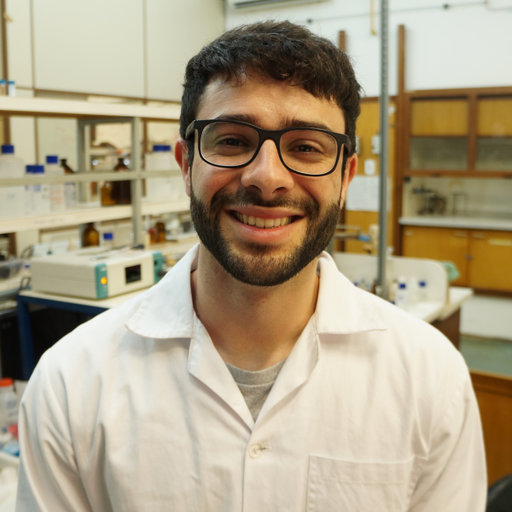

Cristina Henriques, H.BSc. – PhD. Candidate
Cristina is a graduate student in the Applied Bioscience program at Ontario Tech University. Her research will utilize proteomics and metabolomics to determine the toxicological effects of short-chain Perfluorinated Alkyl Substances (PFAS) on Fathead minnows. Her study is composed of both laboratory and field components to evaluate the effectiveness of using proteins and metabolite expression for biomonitoring. Through this, she hopes to aid in validating epidermal mucus sampling as a non-lethal sampling method for biomarker screening. Her research will also be examining the impact that short-chain PFAS has on the blood brain barrier as well as any consequential neurotoxicity.
In her spare time, Cristina enjoys drawing, hiking and reading. She has a strong love for aquatic life and has a deep appreciation for the ocean. She hopes to one day work for Environment Canada to help preserve aquatic ecosystems.
Keisha Deoraj, M.A., B.Ed., B.Sc. – PhD. Candidate
Keisha (she/they) is a graduate student in the Applied Biosciences Program at Ontario Tech University. They have been a student at Ontario Tech University for over a decade, and have received multiple degrees and invaluable experience in science, technology, engineering and mathematics (STEM) and STEM education. Keisha’s previous research explored the online identity development of Indo-Caribbean women in STEM, a project which was inspired by the experiences of the intersectional race- and gender-based discrimination she faced throughout her post-secondary STEM education. She brings an assets-based framework of equity and intersectionality to her current research, which is a collaborative research effort between the Wildlife Conservation Society Canada and Moose Cree First Nation. Keisha is using LC-MS, chemoinformatics and bioinformatics to examine fine-scale measures of the health and condition of “Namew” (Lake Sturgeon) in the Moose River Basin. When not in the lab, Keisha can be found eating, acting, dancing, fishing, and spending time in the sunshine – sometimes all at once!

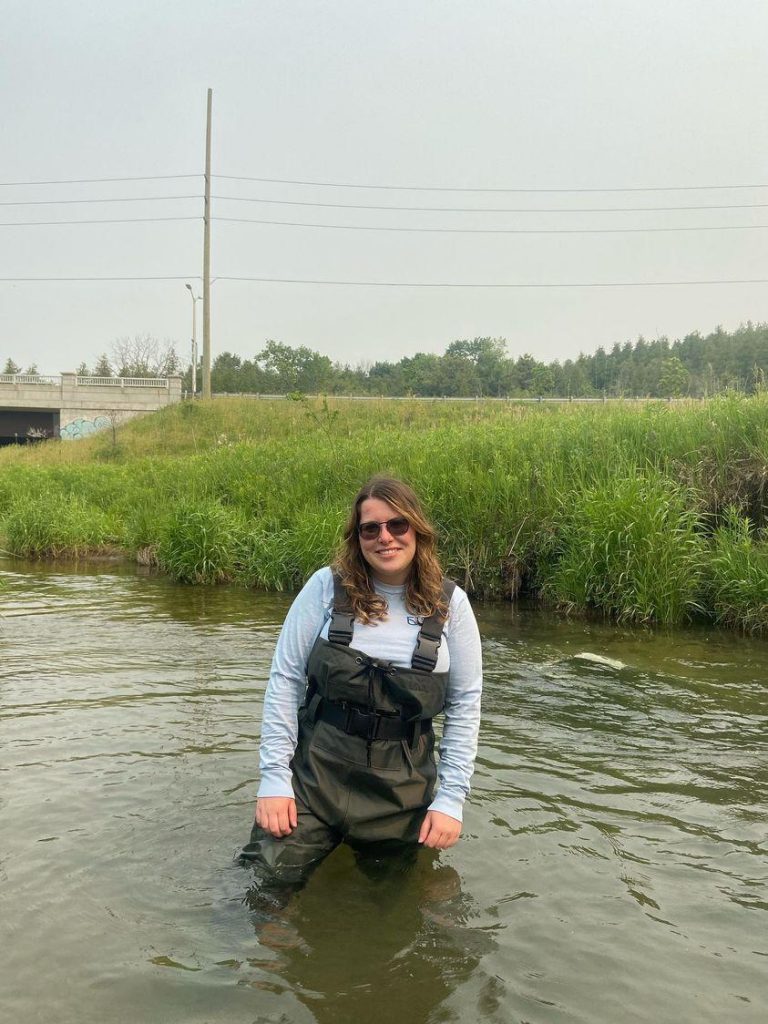
Raina Hubley, H.BSc. – PhD. Candidate
Raina is a graduate student in the Applied Biosciences program at Ontario Tech and is currently studying the effects of quaternary ammonium compounds (QACs) on Fathead minnows. Through this research, Raina hopes to better understand the impact of environmental contaminants on the health of fathead minnows; a sentinel (indicator) species.
In her spare time, Raina prefers to be outdoors hiking, birding, and camping. She also likes to watch movies, create music, and spend time with her family and friends.
Tyler Dow, B.Sc. – PhD. Candidate
Tyler is a graduate student in the Applied Biosciences Program at Ontario Tech University. His research explores the utility of entomotoxicology and wastewater-based epidemiology (WBE) in measuring opioids and associated metabolites. Specifically, he will be working to develop reliable methods to detect and quantify a selection of natural, semisynthetic, and fully synthetic opioids and their major metabolites in insect larvae and municipal wastewater. Tyler hopes this research will validate approaches for opioid detection in these environmental samples to better inform public health and law enforcement agencies.
Tyler’s research interests focus on identifying tools and technologies to better extract and quantify current and emerging drugs and their metabolites within collected toxicological samples. In his spare time, Tyler enjoys cooking, canoeing, listening to music, and watching scary movies.


Aisha Pasha, BSc. – MSc. Student
Aisha is a graduate student in the Applied Biosciences (M.S.c) program at Ontario Tech University. Co-supervised by Dr. Andrea Kirkwood, her project focuses on mercury methylation in Cladophora Mat material collected from Lake Erie. She is investigating how nutrient enrichment, algal blooms, and microbial communities interact to drive methylmercury production. Using molecular tools such as qPCR and multi-omics approaches (proteomics and metabolomics), her work examines the abundance of the hgcAB genes and the role of sulfate-reducing bacteria in mercury cycling. Through her research, Aisha hopes to fill in gaps about mercury cycling to help reduce methylmercury risks in the Great Lakes!
Aisha also completed her Bachelor of Science (B.S.c) at Ontario Tech University, where she completed her Honours thesis on “The Effects of Heat Stress on Fathead Minnow Metabolomics.” She has gained a lot of experience in aquatic toxicology as an Aquatic Omics Facility Assistant and as a Research Fellow during the summer. She hopes to one day pursue a career at Environment Canada.
Outside of the lab, Aisha enjoys exploring nature, baking and reading.
Lauren Song, H.BSc. – MSc. Student
Lauren Song is a graduate student in the Applied Biosciences (M.Sc.) program at Ontario Tech University. Her research focuses on biodosimetry and biomonitoring of low-dose radiation exposures in invertebrates.
She completed her Honours Bachelor of Science (H.BSc.) in Forensic Science with a specialization in Chemistry at Ontario Tech. Before beginning her graduate studies, Lauren worked as a lab technician/research associate at Aquatic Omics Lab, where she developed expertise in liquid chromatography–quadrupole time-of-flight (LC–qTOF) and contributed to projects such as non-targeted metabolomics in wastewater. Outside of the lab, Lauren enjoys going to the gym, dancing, listening to music, and meal prepping.
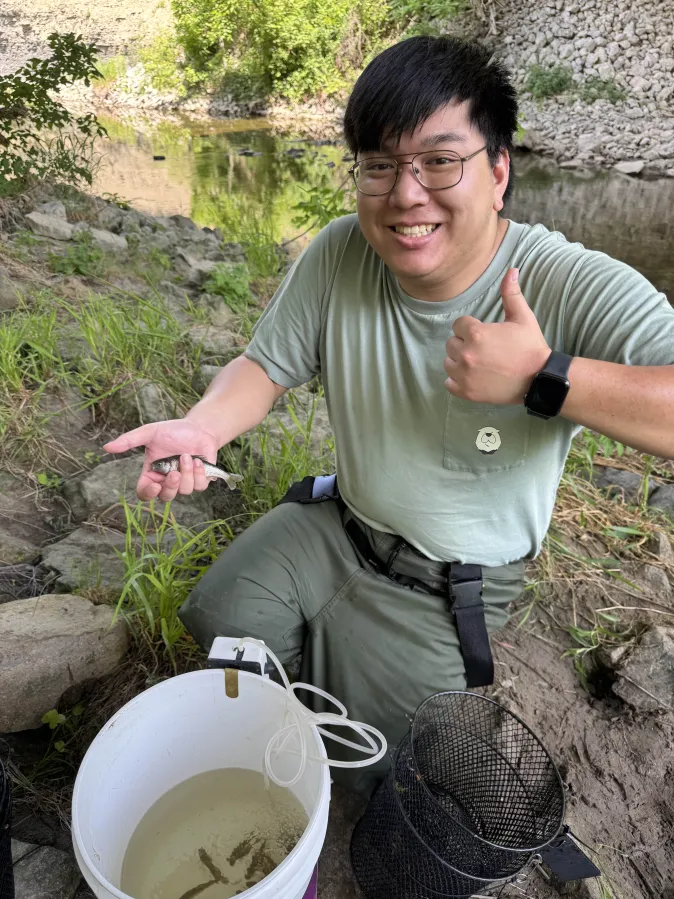
Spencer Hang, BSc. – MSc. Student
Spencer is a graduate student in the Applied Bioscience Program at Ontario Tech University. His research focuses on the effects of low-dose, long-term exposure to nuclear radiation on the proteome and metabolome of Fathead Minnows. His goal is to provide environmental data to support the development of CANDU Small Modular nuclear reactors.
He completed his bachelor’s degree in Biomedical Toxicology at the University of Guelph. His experiences range from aquatic invertebrate toxicology, under the supervision of Dr. Ryan Prosser, to working with fish under the guidance of Dr. Denina Simmons.
In his free time, he enjoys gaming and working on cars and often sneaks puns into conversations. His aspiration is to become a professor in ecotoxicology someday.
Mohammed Faiz Chauhan, H.BSc., MSc. – Research Associate
Faiz was a graduate student in the Applied Biosciences (M.Sc.) program at Ontario Tech and is currently working on finding optimal methods of protein and metabolite extraction from human saliva. Human saliva is a biofluid that contains a diverse collection of metabolites and proteins which can act as biomarkers and be used for potential diagnostic purposes in the future.
Mountain biking and hiking are two of Faiz’s favourite pastimes. Since he was a young child, science had captivated his interest, and the joy he had from comprehending the physical world inspired him to pursue a career in research.
